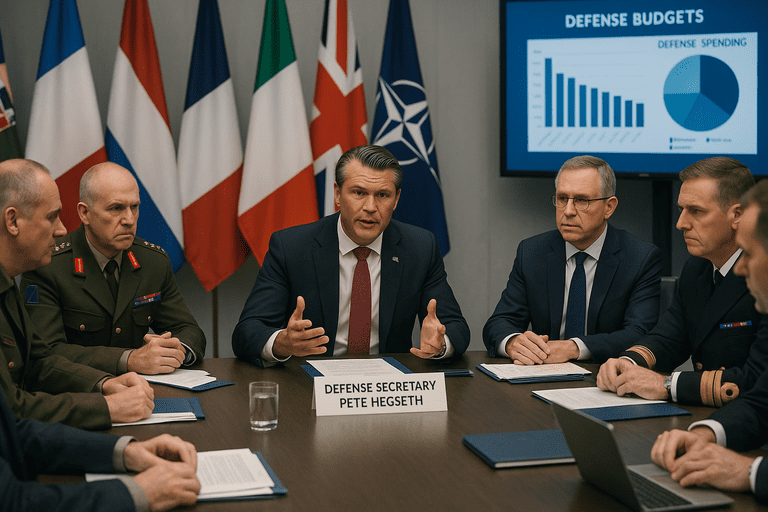The Trump administration has initiated a significant realignment in U.S. foreign policy, focusing on reducing direct military aid to Ukraine and encouraging European nations to assume greater responsibility for regional security. This approach aims to foster a more balanced distribution of defense obligations among NATO allies.
In a recent address, Defense Secretary Pete Hegseth emphasized the necessity for European countries to increase their defense spending. He proposed raising the NATO defense spending target from the current 2% to 5% of GDP. This proposal underscores the administration’s commitment to ensuring that European allies contribute more substantially to their own defense capabilities. As of now, only 22 out of 32 NATO members have met the existing 2% target, indicating a significant gap that needs to be addressed. (apnews.com)
The administration’s policy shift includes a suspension of over $1 billion in U.S. military aid to Ukraine. This decision is intended to encourage Ukraine to engage more actively in peace negotiations with Russia. The White House stated that the pause is necessary to ensure that U.S. assistance contributes to a solution rather than prolonging the conflict. (en.wikipedia.org)
European leaders have expressed varied reactions to these developments. Some officials have voiced concerns about the potential implications for regional security and the balance of power. For instance, Polish Prime Minister Donald Tusk emphasized the importance of collaborative efforts, stating that Ukraine, Europe, and the United States should work together on this matter. (pbs.org)
The administration’s approach also involves reevaluating NATO’s mission and purpose. President Trump has indicated that the United States will no longer tolerate an imbalanced relationship that encourages dependency. Instead, the focus will be on empowering Europe to take ownership of its security responsibilities. (csis.org)
This strategic shift presents several challenges. European nations will need to significantly increase their defense budgets to meet the proposed 5% GDP target. Additionally, the suspension of U.S. military aid to Ukraine may impact the country’s defense capabilities and its position in negotiations with Russia. Furthermore, the reevaluation of NATO’s mission could lead to debates among member states regarding the alliance’s future direction and commitments.
Despite these challenges, the administration remains confident that this policy will lead to a more equitable distribution of defense responsibilities among NATO allies. The expectation is that, over time, European nations will develop enhanced defense capabilities, leading to a more balanced and effective alliance. This approach may require the establishment of new oversight mechanisms and the expansion of existing bureaucratic structures to ensure effective implementation and coordination among member states.
—
Ryan Mitchell reports on military funding, defense policy, and veteran support systems. He is a graduate of The Citadel and served as a civilian analyst for the Department of Defense before entering journalism. His reporting draws on firsthand knowledge of procurement systems, veterans’ programs, and the long-term cost of military readiness.



